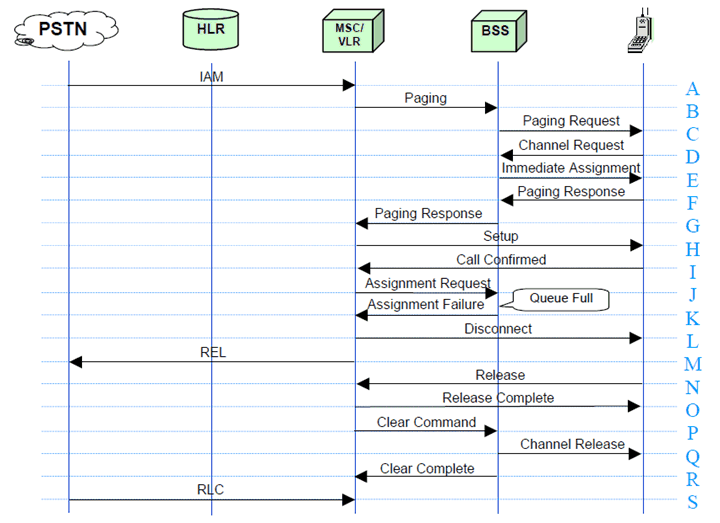Content for TR 22.952 Word version: 18.0.1
0…
4…
4.8…
5
5.1
5.2
5.3
5.4
5.5
5.6
5.7
5.8
5.9
5.10
5.11
5.12
5.13
6…
A…
B
B.1
B.2
B.3
B.4
B.5
B.6
B.7
B.8
B.9
C
D…
5.6 Priority service call termination - radio resources unavailable and queue full p. 25
This clause illustrates a MT Priority Service call establishment with early assignment when the incoming Priority Service call to a wireless called party is received at a terminating MSC. In this scenario, radio traffic channels are not available when the incoming Priority Service call is attempted, and the Priority Service request cannot be queued because the queue for the cell is full and the Service User's Priority Service priority is less than or equal to all the Priority Service requests already in the queue.

A-J.
Same as described in steps A-J of Clause 5.2.
K.
As no idle radio traffic channel is available on receipt of the Assignment Request message, the queue for the cell is full, and the call priority is less than or equal to all the Priority Service requests already in the queue, the call termination request is denied. The BSS returns an Assignment Failure message to the MSC/VLR with cause "No Radio Resource Available".
L.
The MSC/VLR initiates call clearing by stopping all running CC timers, sending a Disconnect message to the MS with cause #34 "no circuit/channel available", and starting CC timer T305.
M.
The MSC/VLR returns an ISUP Release (REL) message to the calling party with cause "no circuit/channel available". Normal ISUP timers apply.
N.
On receipt of the Disconnect message, the MS stops all running CC timers, sends a Release message to the MSC/VLR, and starts CC timer T308.
O.
On receipt of the Release message, the MSC/VLR stops all running CC timers, sends a Release Complete message to the MS, and releases the MM connection. On receipt of the Release Complete message, the MS stops all running CC timers and releases the MM connection.
P.
The MSC/VLR indicates that the radio resource(s) should be released by sending a Clear Command message to the BSS with cause "No Radio Resource Available".
Q.
On receipt of Clear Command message, the BSS sends a Channel Release message to the MS and starts RR timer T3109. When the main signalling link is disconnected, the BSS stops RR timer T3109 and starts RR timer T3111. When timer RR T3111 times out, the BSS deactivates the channels. On receipt of the Channel Release message, the MS disconnects the main signalling link and start RR timer T3110. When timer RR T3110 expires or the disconnection is confirmed, the MS deactivates all channels, considers the RR connection released, and returns to idle mode.
R.
Once the radio signalling channel has been released, the BSS returns a Clear Complete message to the MSC/VLR.
S.
The MSC/VLR receives an ISUP Release Complete (RLC) message from the calling party.